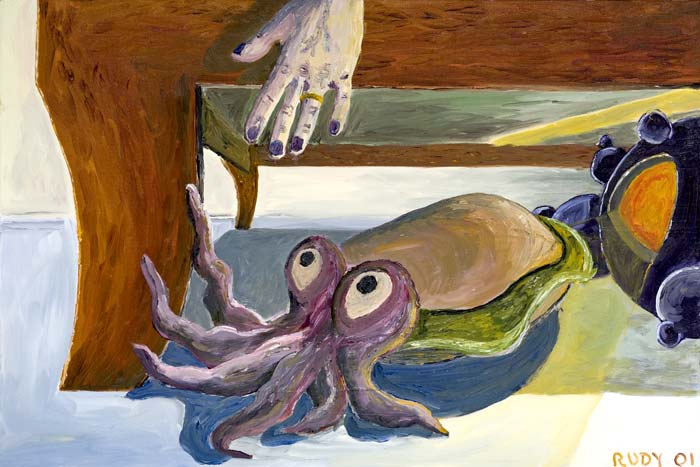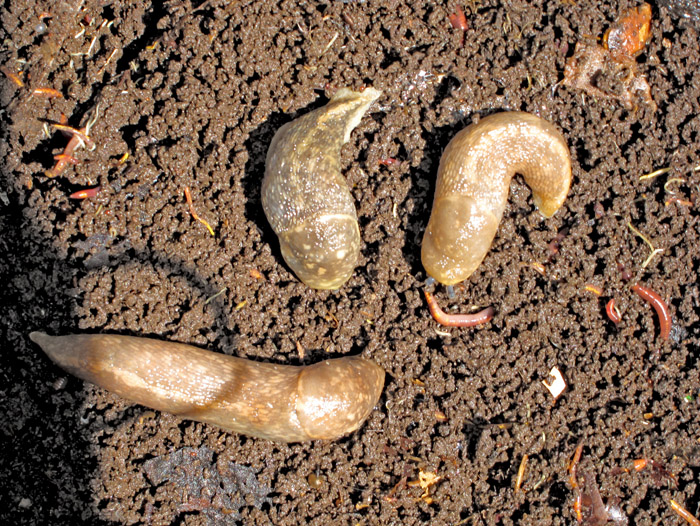
Bring Me the Head of André Breton!
by Robert Guffey

“Perhaps life needs to be deciphered like a cryptogram.”
—André Breton, Nadja
The evening of October 3rd, 1927 promised further debates about the dream worlds the vulgar insisted on calling reality. As if to draw attention to himself, André Breton twirled his cane in the air upon stepping out into the rain-soaked street. The pavement was still wet from the early morning drizzle. Like a child, Breton hopped from puddle to puddle, splashing water onto surprised passersby. One man attempted to strike him in the jaw for this offense, but Breton merely ducked the punch and ran away. He may have been crazy, but he wasn’t stupid. Physical altercations were not his strong point.
Breton didn’t like doing things he didn’t do well. That’s why he refused to secure a regular job, like the sleepwalking members of the bourgeoisie. Instead, he slept soundly during the day and arose late in the afternoon, eager to begin his nightly discussions-cum-arguments with Antonin, Paul, Louis, Max, and all the regulars at Café Cyrano. This was his present destination. He couldn’t wait to show all of them his most recent experiment in automatic poetry. He was certain he had tapped a fruitful center of his inner dream life. The latest entry in his journal represented a definite breakthrough.
While reflecting on the exquisite oneiric quality of this entry, Breton noticed a strange indigo light floating in the air before him. He rubbed his eyes, thinking the light to be an optical illusion. However, no matter how much he rubbed, the light would not go away. On the contrary, it expanded to conspicuous proportions. When it had reached the size of a manhole cover, it ceased its movement and hovered directly above his head. It flashed sky-blue for a second, after which a thick leather tome fell out of the light and struck Breton in the skull. He toppled into a puddle of rain water, muttering a number of surreal invectives the entire time: “Orangutan! Lobster beard! Cancerous night gown!” Breton was never satisfied with clichés, not even when he was derrière-deep in water.
The young artist managed to extricate himself from his horizontal position. He stared down at his soiled clothes in disgust. He cocked his leg back, ready to kick his leather bound assailant to the moon—but something stopped him. He noticed the book’s title, which caught his unusual fancy:
BRING ME THE HEAD OF ANDRÉ BRETON!
Tentatively, he reached down and touched the book. It neither blinked out of existence nor dissipated into a fine mist, as Breton (for some unexplainable reason) thought it would. It remained as real as himself, however real that was. He grabbed the book by two hands and hefted it upwards with some difficulty. He thought, This illusion’s as heavy as a sewing machine and an umbrella on an operating table. He opened it to the first page, blowing what appeared to be centuries of dust off the brittle leafs.
There were no words to be read on the page. Instead, a beam of emerald light erupted from the book and hit Breton between the eyes. One moment, he was standing in the streets of Paris, the next, he was lying on an operating table in a circular chamber with mirrored walls that reflected nothing except Breton himself. Bent over him was an eight-foot-tall gentleman wearing a tuxedo. There were two conspicuous details about this individual that disturbed Breton: 1) in his right hand he held a nasty-looking scalpel that seemed to be made of obsidian, and 2) his head resembled that of an enormous bird with tick-infested black feathers.
Breton didn’t have long to contemplate this creature, though. Instead he was much more intrigued by the words that appeared in his head—not auditory words, but visual words. It was as if someone had placed a movie screen in his brain and was projecting letters onto it. The letters looked like this:
(Speak up, my friend, you’re not hexed! I’m surprised to see you so soon. I asked my scow to send for help / / ago and /he~she~it/ did so much sooner than /he~she~it/ usually does. The hyperdimensional gridpoint of your fair city must be ideal for /his~her~its/ internal biomorphic tracking system. Don’t you agree?)
“Who—who are you? And what’s that scalpel for?”
(I am known as /Loplop/. It’s an honor to meet you, Monsieur Breton. As for the scalpel, I’m not quite certain what you’re talking about. I think if you could just calm down a bit you would no doubt be able to see me a little better.)
Against his will, Breton closed his eyes and drifted into a meditative state; he could feel his heartbeat and breathing slowing down, slowing down. Seconds later, he opened his eyes and found himself staring up at an immense creature that looked rather like a headless Sphinx. It hovered above the operating table, flapping its wings in the air, causing a cool wind to waft across Breton’s face. A silvery tube that resembled an artificial umbilical cord ran from the belly of the Sphinx up into the energy-charged, crackling wisps of fog that drifted far, far above him. The room’s ceiling could not be seen through the fog.
(I have an acute problem) said the Sphinx, which transformed into a ghostly Mona Lisa with a single bloodshot eye on the side of her forehead. Her moustache needed a trim, Breton thought. (My craft’s interdimensional mesh is somewhat out of / /. The craft is able to slip in and out of time~space only due to the /chaosdrive/. By introducing random elements of data, both factual and erroneous, into the /Oneiricon/—the central component of the /chaosdrive/—the craft is capable of warping the traditional rules of physics. Are you following this, Monsieur?)

“Certainly,” he said, though he really had no idea what Loplop had just said. Was the creature practicing some form of automatic writing?
(Excellent) said Loplop, whose physical appearance shifted yet again. It now looked like a naked woman with a beautiful, curvaceous body and the head of a sickly gray pigeon… or something that looked like a sickly gray pigeon. Wings spread out of her shoulder blades, allowing her to hover in midair. A pair of lovely green eyes peered at him from just above a curved, razor-sharp beak. (I knew I chose well with you. Most humans would be too unimaginative to even get past my first sentence.) Breton preened, ecstatic that his superior sensibilities had at last been confirmed by a higher power. (You probably already know what I’m / /, Monsieur. The /chaosdrive/ in the /Oneiricon/ was damaged when I accidentally flew through a dreamstorm after my vacation in the Boötes constellation was abruptly cut short. All randomness has leaked out of the /drive/. It only feeds itself long, scholarly footnotes from what you call the /Akashic Records/. As long as this continues, I’ll never be able to escape hyperspace. Can you /help/ me, Monsieur?)
Breton stroked his chin. “I’m not quite sure what I could do for you.”
(You can introduce randomness back into the Oneiricon. I’ve been told by many reliable sources that you’re the greatest poet of /Earth/. Were my sources correct?)
The words “greatest poet” burned in his brain. His heart swelled as he said, “Oh, they could not be more correct, my dear sir!”
(Wonderful. Here, please /suck/ on this.) A glass filled with pink liquid, a slice of lemon, a tiny red umbrella, and a thin plastic tube with red stripes on it appeared before him, floating in the mist as if held aloft by an invisible waiter.
“What’s this?” Breton asked, snatching the glass out of the air.
(Please /suck/ on the straw and compose a poem in your mind. Whatever you think will be transferred into the /Oneiricon/.)
Breton sniffed the liquid, but there seemed to be no odor to it at all. Could it be poison? He suddenly recalled all the stories he’d heard as a child concerning human beings kidnapped from their homes and carried away by little men to a strange world where they were forced to consume sweet nectar that made them sleep for a thousand years. Though Breton enjoyed sleeping, he didn’t want to do it for that long.
“Uh, is this necessary?” he asked, holding up the glass.
(It’s all part of the procedure) Loplop replied. (The /Oneiricon/ has to receive the data somehow, does it not? It cannot do the impossible. Do you think it can read minds?) The being seemed quite annoyed by the poet’s question.
Breton laughed. “No… no, of course not.” Wincing from apprehension, he wrapped his lips around the plastic tube and puckered up, sucking the odd liquid into his mouth while allowing random words to float up from his subconscious, just like he often did while writing in his cluttered journal.
He saw the words printed out on the screen in his mind:
(Turning from sentient ice crystals
Of tears laced with memories,
From horrid destinies of tar
And death, from the dread
Inevitability of long-sought
Blossoms and mute clues,
The labyrinth of Law smiles
Its stalactite smile at the remnants
Of chance laid along the shiny counter
In rows of three and eight and sixteen,
Never once knowing the contents
Of the hollow chambers within
My child’s ancient, platypus brain.)
(That should do quite well!) Loplop said, and the pink drink vanished with an echoing… anti-sound? This was the way Breton thought of it. Not only did the phenomenon not make noise, but it seemed to amplify silence. Breton was relieved,—even though he thought the poem wasn’t quite finished—for it was difficult to drink without a break, particularly while attempting to compose jabberwocky.
The avian woman spun around three, six, nine times as the color of her gray feathers brightened to yellow, then metamorphosed back into the birdheaded gentleman Breton had first encountered upon his arrival. The gentleman was now encumbered with the Sphinx’s umbilical cord, which had grown fiery orange. (Oh, I feel much better) the bird-man squawked, the cord pulling him slowly toward the distant ceiling. (I suppose I will be going home now. Send my regards to your fellow /Earthlings/. Please remind them to 1) curb their basic urge to engage in sectarian warfare, 2) maintain a healthy relationship with the /Earth’s/ environment, and 3) remember that beauty will be CONVULSIVE or will not be at all.
Breton could do nothing as he watched the birdheaded gentleman grow smaller and smaller and smaller, until the creature was at last eaten up by the misty ceiling. At which point the room began collapsing in upon itself like a whirlpool, drawing everything toward a pinhole-sized black hole hovering in the middle of the air. Breton screamed as he tumbled into its swirling center like the old sailor in Poe’s “A Descent into the Maelstrom.” But unlike the sailor, Breton could not save himself at the last second through observation and logic….

An ecstatic feeling, tantamount to having ingested all the opium in the world, spread throughout his body, twisted his psyche inside out, and flung his mind across eternity into an endless wall of blood-red energy and out the other side… where Breton landed on his derrière in a deserted Parisian street that was still wet from the early morning rain. Sitting beside him was the leather bound book that had drawn him into this mess. Curiosity overcame his nervousness. With great care he opened the cover and was surprised to find his newly composed poem inscribed on the first page. The rest of the tome, however, was blank.
A newfound strength animated Breton’s muscles. He picked up the elephantine volume with one hand and ran down the slick streets toward Café Cyrano, eager to share his odd experience with all his friends.
As he neared the café, the tome seemed to share his excitement. It began to vibrate in his hand. It heated up to a temperature near boiling, forcing Breton to throw the book onto the sidewalk. It flopped spastically at his feet like a dying fish. Before he could even wonder how to act, human-like wounds opened in the leather cover and bled a thick horde of white moths. The cloud of ivory-colored insects spiraled around his body, fluttered up into the air like a living mist, and were soon invisible against the overcast dome of the sky. Breton stood motionless, looking up at nothing for quite awhile. He felt as if a part of him were still floating somewhere in Loplop’s void.
By the time he refocused his gaze on the sidewalk, the book had disappeared. In its place, seemingly dragging itself to nowhere, perhaps looking for shelter among the knife-sharp stones of the street, was a lame pigeon with little human arms instead of wings. It appeared to be whimpering, attempting to form human words with its fractured beak. Breton simply stared at this creature for awhile before carrying it into the reassuring warmth of the nearby café.
Already, he knew it was going to be another strange and puzzling evening with the boys.
About the Author

Robert Guffey’s short stories, articles and interviews have appeared in such magazines and anthologies as After Shocks, Catastrophia, Chimeraworld, The Chiron Review, Dark Jesters, Escape Clause, The Fortean Times, Modern Magic, The New York Review of Science Fiction, Particules, The Pedestal, and The Third Alternative. Further stories are scheduled to appear in Aoife’s Kiss edited by Tyree Campbell, Art From Art edited by Steve Soucy, and Postscripts edited by Peter Crowther and Nick Gevers.
His first book of fiction, a collection of novellas entitled Spies & Saucers, is forthcoming from PS Publishing. His first book of non-fiction, Cryptoscatology: Conspiracy Theory as Art Form, is forthcoming from TrineDay. He is currently teaching English at CSU Long Beach and can be contacted at rguffey@hotmail.com.
Post a comment on this story!